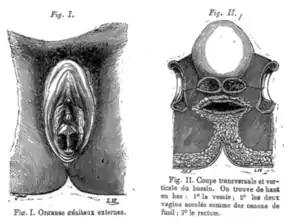Vaginal septum
A vaginal septum is a vaginal anomaly that is partition within the vagina; such a septum could be either longitudinal or transverse. In some affected women, the septum is partial or does not extend the length or width of the vagina.[1] Pain during intercourse can be a symptom. A longitudinal vaginal septum develops during embryogenesis when there is an incomplete fusion of the lower parts of the two Müllerian ducts. As a result, there may appear to be two openings to the vagina. There may be associated duplications of the more cranial parts of the Müllerian derivatives, a double cervix, and either a uterine septum or uterus didelphys (double uterus).[1][2] A transverse septum forms during embryogenesis when the Müllerian ducts do not fuse to the urogenital sinus. A complete transverse septum can occur across the vagina at different levels. Menstrual flow can be blocked, [3] and is a cause of primary amenorrhea. The accumulation of menstrual debris behind the septum is termed cryptomenorrhea. Some transverse septa are incomplete and may lead to dyspareunia or obstruction in labour.[4][5]
| Vaginal septum | |
|---|---|
 | |
| Specialty | Gynecology |
See also
References
- Heinonen, Pentti K. (2006-03-01). "Complete septate uterus with longitudinal vaginal septum". Fertility and Sterility. 85 (3): 700–705. doi:10.1016/j.fertnstert.2005.08.039. ISSN 0015-0282. PMID 16500341.
- Perez-Brayfield MR, Clarke HS, Pattaras JG (September 2002). "Complete bladder, urethral, and vaginal duplication in a 50-year-old woman". Urology. 60 (3): 514. doi:10.1016/S0090-4295(02)01808-3. PMID 12350504.
- "Urology Care Foundation - What Causes Congenital Vaginal Obstruction?". www.urologyhealth.org. Retrieved 2018-03-09.
- Üstün Y; Üstün YE; Zeteroğlu Ş; Şahin G; Kamacı M (2005). "A Case of Transverse Vaginal Septum Diagnosed During Labour" (PDF). Erciyes Medical Journal. 27 (3): 136–138.
- Dey, Pranab (2017-02-06). Essentials of Gynecologic Pathology. JP Medical Ltd. ISBN 9789386261205.